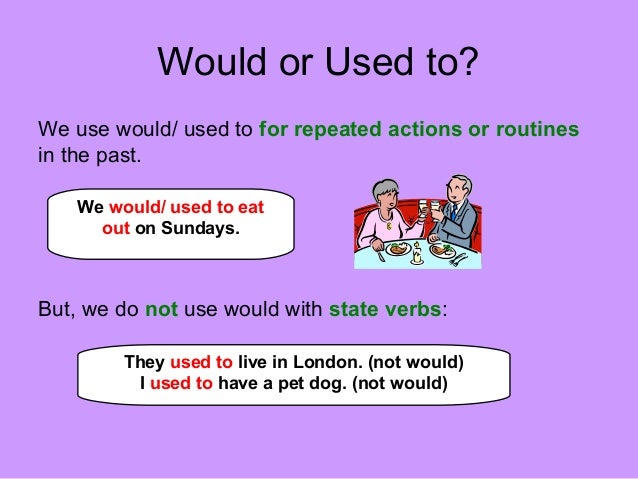We use both of these to talk about things in the past which we don't do now or are not happening now. Sometimes both 'used to' and 'would' are OK in one sentence - sometimes only 'used to'.
Let's start with some examples of 'used to' first.
We might say,
"I used to live in Manchester, but I moved to London last year."
"When he was at school, he used to play football every Saturday."
"She used to hate her job until she got a promotion."
All of these sentences describe actions or situations in the past which are finished now; living in Manchester, playing football every Saturday, hating her job - these are all finished now.
Check out the short presentation below.
Now let's move on to 'would'. Here are some examples:
"When he was at university, he would sleep until noon at the weekends."
"My sister lived in Australia for many years, but she would always come home for Christmas."
"I would always forget my homework until the teacher threatened to punish me."
Again, these sentences are about situations in the past, which are finished.
However, it's important to notice that all the sentences, here, are about actions or situations which were repeated again and again and again.
This is the difference between 'would' and 'used to'
- We only use 'would' to describe actions or situations that were repeated again and again and again... But we use 'used to' for any extended action or situation in the past.
'Would' is only good for actions or situations that were repeated many times; 'Used to' is good for any action or situation that continued for a period of time in the past, including repeated actions or situations.
To make this clearer, let's look at the three examples of 'used to' sentences, and see if we can change them into 'would' sentences.
Here's the first example again: "I used to live in Manchester, but I moved to London last year."
Can we use 'would' instead of 'used to' here? No, we can't, because 'living in Manchester' wasn't repeated again and again and again. It's simply a situation in the past. Therefore, only 'used to' is good in this sentence.
The second example again: " When he was at school, he used to play football every Saturday." Here, we're talking about 'playing football every Saturday'. This is an action that was repeated many times, so we can also say: "When he was at school, he would play football every Saturday". 'Used to' and 'would' are both good here, and the meaning is the same.
Finally, the third example again: "She used to hate her job until she got a promotion." Did she 'hate her job' many times? No, this isn't a repeated action, so in this example 'would' isn't possible. We have to use 'used to'.
Extra tip: Research shows that statements about the past with wouldn’t are not very common. Instead, you can use the negative form of the simple past, as in
In the past, they didn’t bathe often.
Let's check now how much you have learned today.
Exercise 1 Exercise 2 Exercise 3






